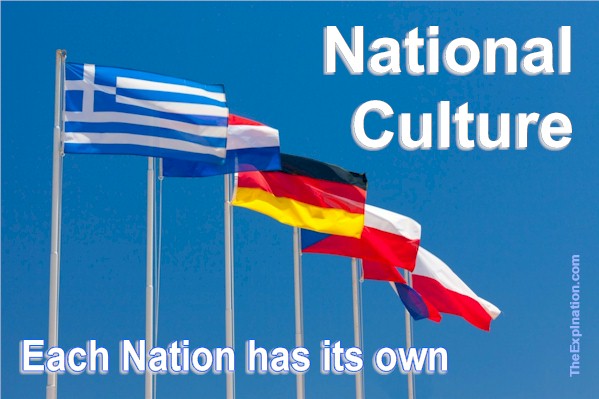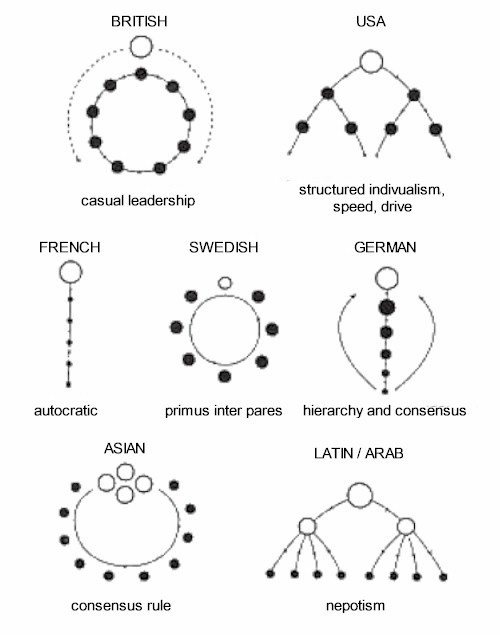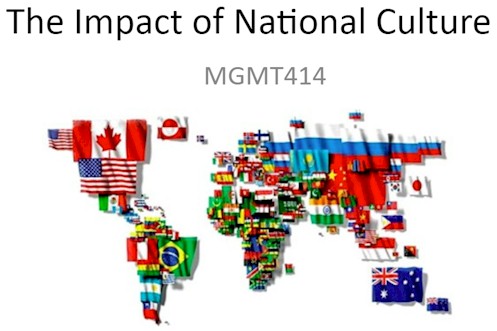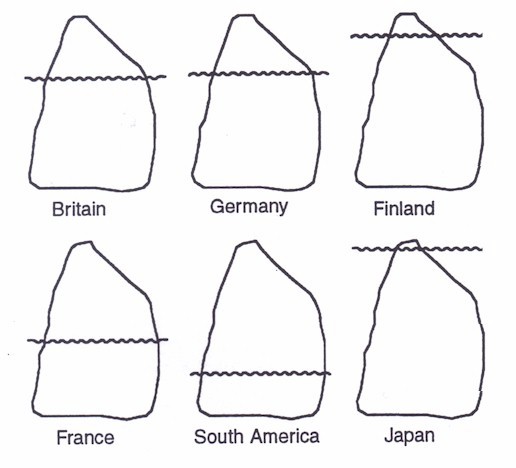Contents
Nations have their own heart. Their citizens are attached to their nationality, their traditions, and their culture.

Nations of the world. Each one has its own cultural traditions and heritage. Patriotism talks to the national culture.
Nations and peoples are characterized by their values, traditions, foods, music, sports teams there’s a patriotic fervor whenever there’s any type of competition or conflict. Look at World Cup fever, flag-waving at the Olympic Games. National identity even goes much further than that.
(Audit of Humankind, chapter 3.11)
We’re discussing the structure of human society, the relationship between human beings, locally and internationally. We’ve discussed the equality of human beings and that humanity is composed of two compatible genders. The basis is that the only way to procreate is for two individuals, one of each gender, to come together. We’ve discussed the formation of such couples. Dating, engagement, courtship, bride, and groom. This leads to marriage and husband and wife with its beneficial effects. The family is the cornerstone and parenting with its complementary roles being the ideal incubator for the next generation which leads to extended families. The development of clans and tribes.
The next step up from clans and tribes of hundreds to thousands and millions of people is nations. It is estimated there are between 195 and 249 countries in the world, depending on the criteria used to define them. Although the Vatican is the smallest with a population of just a few hundred, because of its nature (few procreating couples) I will not consider it in this context. The next is Tuvalu, a minuscule group of islands in the Pacific. You know this country via its top-level domain name, .tv. Very popular, it represents 10% of the nation’s income! The largest nation is, of course, China with over 1.4 billion inhabitants.
Be it the smallest or largest, each has a specific culture. Read about Tuvalu’s dance and music, heritage, sports and leisure and cuisine using the staple coconut (including its milk) and fish in the atoll. China consists of 91% Han Chinese but there are many cultures and quite different languages as well.
That there are small and large countries is a given. What I would like to focus on is more the notion of nationalities and peoples within those countries. In the last post about clans, I included a video about ethnic street food, hot dogs in the USA, waffles in Belgium, falafel in Israel or pulaka dishes in Tuvalu. I mentioned the marked difference in many fields like clothing for both men and women, embroidered bags and purses, song, dance and entertainment, and language expressions.
Differences go much deeper than this when it comes to nationalities and, as we’re going to see, on a much broader scale between Eastern and Western peoples. In the context of human society and social relationships, it is very important to understand such variance and even contrast in customs, attitudes, and thinking. Yes, Easterners, Asiatics (who have grown up in that part of the world) have a different approach to concepts, situations, and problems than we do in the West.
In the context of The Explanation, I’m asking the question how is it that from two procreating human beings we can end up with such contrasting nationalities and peoples? We have vast groups composed of millions of people with specific characteristics (physical and mental) that characterize them. How did these groups start? Where and when do their identifying characteristics originate?
The diagram below reveals how different nations have their own organizational structure for business, meetings, clubs and other institutions where a hierarchy is necessary. It may, and probably will make you smile or laugh, if you’ve been involved with various types of intercultural activities. But, you know that this is not just humorous, it is the case.

Nations and their organizational structure for activities that necessitate some type of hierarchy
Westerners and especially North Americans want to get right into business. They generally come with a prepared agenda, point by point, argument by argument they proceed, following their carefully pre-laid out plan. While Easterners want much more of a social setting, they want to get to know with whom they’re dealing. the palaver tree method where traditionally people would go to discuss situations (disputes, decisions, judgments) which can seemingly go on forever and then, surprisingly they reach a quick decision. Not always based on logic as we’d put it.
Here’s a slideshow of the Impact of National Culture mainly in business. It compares various countries on all continents in areas like networking, basis for motivation, individualism, long and short-term orientation. It reveals a couple of interesting items. Firstly, how certain related countries in Asia or in Anglo-Saxon regions have similar business cultures. Secondly, how Asians and Anglo-Saxons differ.

Impact of National Cultures in the business sphere. Nations have distinct traits that we need to be aware of if we’re working with or in those countries.
Once again, in the context of human society and social relationships the point is that although there are seven billion different people in the world, there are groups, nations that have distinct cultural personalities.
There are many works on this subject. Here’s a very interesting viewpoint from Richard Nisbett who had his eyes opened by one of his students. This is much deeper than cuisine, attire and dance costumes. It focuses on the mind. I’ve pointed out that the human mind is what confers on humankind their singularity in comparison to animals. You can download this interesting read. The Geography of Thought: How Asians and Westerners Think Differently…and Why. Here is the basis for this book about the difference in mindset.
One day early in in our acquaintance, one of my students said, “You know, the difference between you and me is that I think the world is a circle, and you think it’s a line.” He continued, “the chinese believe in constant change, but with things always moving back to some prior state. They pay attention to a wide range of events; they seearch for relationships between things; and they thibnk you can’t understand the part without undersdaind the whole. Westerners live in a simpler, more deterministic world; they focus on salient objects or people instead of the larger picture; and they think they can control events because they know the rules that govern the behavior of objects.”
What is explained in this book is that they have a Westerners and Easterners have a different way of thinking and reasoning. Easterners are much more community, welfare, interior peace, mindfulness, well-being oriented. On page 3 we can see the impact cultural thinking has on the Western and Eastern way of life.
The Chinese would not have felt themselves to be the helpless pawns of superiors and family members. On the contrary, there would have been a sense of collective agency. The chief moral system of China—Confucianism—was essentially an elaboration of the obligations that obtained between emperor and subject, parent and child, husband and wife, older brother and younger brother, and between friend and friend.
Chinese society made the individual feel very much a part of a large, complex, and generally benign social organism where clear mutual obligations served as a guide to ethical conduct. Carrying out prescribed roles—in an organized, hierarchical system—was the essence of Chinese daily life. There was no counterpart to the Greek sense of personal liberty. Individual rights in China were one’s “share” of the rights of the community as a whole, not a license to do as one pleased.
This is far deeper than clothing, music and food differentiation between nations and people. It goes to the heart of human beings. The above quote refers to ethical conduct and how Confucianism is its code of mutual obligations that dictates a generally benign society. I discussed ethics as the basis of behavior to guide our human nature and free will.
It behooves us to ask what is the Western ethical base today? Especially in our individualistic society, so different from the East.
There are fundamental differences at the level of human nature among nations. The internal working of the mind. There are organizational differences and behavioral differences in the way peoples communicate. Share on XWe’re discussing fundamental differences at the level of human nature. The internal working of the mind. Not just on an individual basis but on a national level. There are not only organizational differences as we saw in the diagram above but behavioral differences in the way peoples communicate. The iceberg represents all the thoughts in your mind. the visible part of the iceberg is what you communicate, what you talk about. Individually we can be open or closed communicators but nationally these characteristics are markers.

This speech-to-thought iceberg diagram reveals how each nation speaks its mind.
How did such deep-rooted differences characterize each group as world population grew over the decades, centuries and millennia? Where and when did it start? Why do we have such configurations today? These are difficult questions which I will broach in Origin of the Universe.
Here, I just want you to realize that such differentiation is real and has impacted Western society much more than we might realize. For want of space, I cannot go in-depth into the state of 21st-century geopolitics. The basis to keep in mind is misguided rulership and social relations.
Misguided, not to say, corrupt and misappropriated HOME rulership is the fundamental cause of slavery and the massive migrations we’re witnessing from the Southern to the Northern hemisphere. People are leaving their countries because of political unrest and poverty both of which have a deep basis in incorrect leadership and hence, rulership.
Misappropriated HOME rulership is the fundamental cause of the massive migrations from the Southern to the Northern hemisphere. People leave their countries because of political unrest and poverty caused by incorrect leadership and… Share on XFrom the internal strife in the Congo to the Rohingya refugee crisis in Myanmar to the breaking apart of Yugoslavia, from the Mediterranean refugees to the thousands of kilometers of border-walls in umpteen nations it comes down to rulership not putting their people at the heart of their concerns. By not doing this, rulers put the burden on other countries to pick up the broken pieces. And broken pieces can never be put together as they were before.
When foreigners arrive in a new country as settlers they tend to congregate together. They form quartiers and neighborhoods. Often a whole shopping area will be overseen by one ethnic group. The reason for this is because people of the same ethnic origin feel more comfortable among there own, even if there are wrong-doings. They even take care of conflict, their own way, among themselves. This is the ethnic deep-rootedness we’re discussing in this post.
People of the same ethnic origin feel more comfortable among there own. They even take care of conflict, their own way, among themselves. This is the reality of ethnic deep-rootedness. Share on XIf HOME rulership in many countries around the world were what it should be, multiple millions of migrated people, originally from those countries, would return home immediately. People want to be reunited with their own family, extended families, ethnic groups. They want to bear the burdens and especially enjoy the benefits of their own deep-seated ethnic culture. That is the nature of human society and social relationships.
This blog post is an excerpt from chapter 3.11 of the book Audit of Humankind.
Dig Deeper into The Explanation
Online Study Courses to Uncover the Mystery of Adam and Eve’s Nakedness… with no fuss. Free video mini-course revealing the God-intended meaning of Scripture via Biblical Hebrew. It’s so easy, it’ll blow you away. Join now and add new motivation to your Bible study.
Join The Explanation Newsletter to stay informed of updates. and future events. No obligations, total privacy, unsubscribe anytime, if you want.
The Explanation series of seven books. Free to read online or purchase these valuable commentaries on Genesis 1-3 from your favorite book outlet. E-book and paperback formats are available. Use this link to see the details of each book and buy from your favorite store.

Since you read all the way to here… you liked it. Please use the Social Network links just below to share this information from The Explanation, Nations Are Identified by Their Own Patriotic Ethnic Culture



Trackbacks/Pingbacks